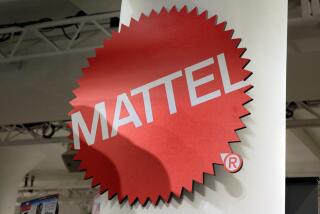Mattel, Hasbro Could Lose Key Products in Deal
- Share via
Antitrust regulators are likely to force Mattel Inc. and Hasbro Inc. to divest a portion of their vaunted toy lines as a condition of approving Mattel’s acquisition of the rival toy giant, many antitrust experts say.
However, the possibility of a harsher-than-expected restructuring could reduce the value of a combined company, thus making the deal worth less to Mattel, analysts say. That could reduce the price of Hasbro shares--which have gained 41% since Mattel made its offer public Wednesday--as El Segundo-based Mattel may not be willing to offer as much.
Antitrust questions have become central to the merger bid, under which Mattel is proposing a $5.2-billion stock swap. Hasbro on Thursday shifted the focus by extensively citing its antitrust concerns as the reason for its rejection of a proposal to marry Mattel’s Barbie and Hasbro’s GI Joe in a union of the nation’s largest toy companies.
In response, Mattel on Friday said Hasbro has flip-flopped--contending that Hasbro previously held different positions on antitrust questions. In earlier talks, Hasbro also appeared willing to accept a deal if Mattel would pay it more than $100 million in the event of a government rejection of the merger plan, Mattel said Friday.
Meanwhile, the institutions that control 70% of all Hasbro stock--the shareholders who could force Hasbro to negotiate a merger deal with Mattel--are trying to determine the regulatory risks.
Hasbro shares rose in active trading Friday for the second straight day on the American Stock Exchange, closing at $43, up $2.50.
Mattel is offering Hasbro shareholders 1.67 shares in a Mattel-Hasbro entity for each share of existing Hasbro stock.
Some of the major criteria in antitrust considerations, according to legal experts:
* Pricing. The level of price competition is a crucial issue for the Federal Trade Commission and the Justice Department.
Trade groups representing smaller toy retailers are reportedly concerned that their members may not have leverage with a merged Mattel-Hasbro to negotiate prices low enough to earn them a fair profit. Five chains--Wal-Mart, Toys R Us, Kmart, KayBee and Target--dominate toy retailing.
With Barbie and the tot-oriented Fisher-Price division in its stable, Mattel’s strengths are in the fashion-doll and infant-toy categories. With male action figures such as GI Joe and the Milton Bradley label under its roof, Hasbro is strong in boys’ toys and board games.
However, Hasbro’s Playskool division competes directly with Mattel’s Fisher-Price in toys for young children, and the potential for dominance in the preschool toy category would prompt regulators to block the deal or force the company to divest certain lines, antitrust lawyers say.
* Ease of entry. Although it is not difficult to start a toy company, antitrust experts are divided on whether new companies would be able to challenge a merged Mattel-Hasbro in even one of its toy categories.
“The government would try to determine how long it takes for a new competitor to enter as well as the entry costs and the identity of possible new competitors,” said Barry Pupkin, a Washington-based antitrust lawyer. “I would suspect that there are foreign competitors ready to come in.”
However, Ilene Gotts--another Washington-based antitrust litigator--disagrees.
“We won’t see a toy company come in and develop a major presence,” she said. “A new competitor wouldn’t get adequate access to retail shelf space.”
* Distribution. Regulators are especially concerned about the clout that allows a toy maker to enter into exclusive arrangements with retailers that essentially lock out potential competitors and control supply and pricing.
Some major toy retailers have already expressed concern about the clout of a Mattel-Hasbro entity. However, regulators may be less concerned about those obstacles if they conclude that access is blocked because a few retailers also control too much of the market.
Hasbro has disclosed that the FTC is conducting an inquiry into distribution patterns in the toy industry. It reportedly is investigating complaints that Toys R Us has unfairly used its marketing power to discourage manufacturers from selling popular toys to smaller competitors such as discount stores.
The FTC is reportedly also looking into claims that some of the biggest toy makers--including Mattel and Hasbro--conspired with Toys R Us to limit opportunities for rival retailers.
Meanwhile, securities regulators said Friday that they are investigating an unusually high interest in Hasbro securities before the Mattel offer was disclosed.
(BEGIN TEXT OF INFOBOX / INFOGRAPHIC)
Toying With Marriage
A combination of Mattel Inc. and Hasbro Inc., the world’s two largest toy makers, would dominate the lucrative toy business. For 1994, their combined revenues were about $6 billion, or eight times more than the nearest competitor. A look at the top five toy makers worldwide:
*--*
Rank Toy maker 1994 sales** 1 Mattel Inc. $3.2 2 Hasbro Inc. 2.7 3 Tyco Toys Inc. 0.8 4 Little Tikes* N/A 5 Bandai Co. N/A
*--*
* A division of Rubbermaid Inc.
**(in billions)
Sources: Bloomberg Business News; Toy Manufacturers of America
Researched by JENNIFER OLDHAM / Los Angeles Times
More to Read
Inside the business of entertainment
The Wide Shot brings you news, analysis and insights on everything from streaming wars to production — and what it all means for the future.
You may occasionally receive promotional content from the Los Angeles Times.










